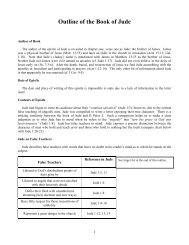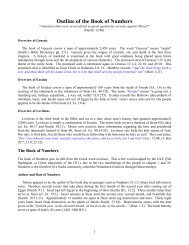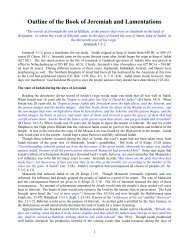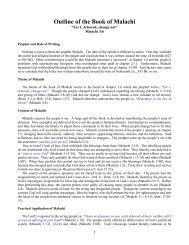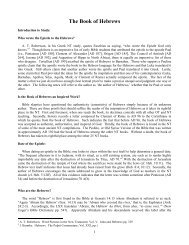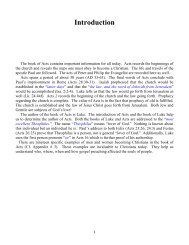Outline of the Book of I Timothy - The Floral Heights Church of Christ
Outline of the Book of I Timothy - The Floral Heights Church of Christ
Outline of the Book of I Timothy - The Floral Heights Church of Christ
You also want an ePaper? Increase the reach of your titles
YUMPU automatically turns print PDFs into web optimized ePapers that Google loves.
2. Diakonesanteo) deacon (ASV) (I Tim. 3:13) (Translated “having ministered” {NM}). {Same as<br />
B1 above}.<br />
III. <strong>The</strong> deacons work:<br />
A. <strong>The</strong> <strong>of</strong>fice <strong>of</strong> deacon is, by definition, a man who executes <strong>the</strong> commands <strong>of</strong> <strong>the</strong> bishop. He has charge<br />
<strong>of</strong>, and distributes, <strong>the</strong> money collected. He is to be a servant in <strong>the</strong> church in all sense <strong>of</strong> <strong>the</strong> word.<br />
He will make sure that <strong>the</strong> poor and physically needy <strong>of</strong> <strong>the</strong> church who have no o<strong>the</strong>r family members<br />
to take care <strong>of</strong> <strong>the</strong>m are taken care <strong>of</strong> with <strong>the</strong> church treasury (consider Acts 6:1ff). This man will also<br />
spend time in preaching <strong>the</strong> word <strong>of</strong> God. If ever <strong>the</strong>re were a humble do all man <strong>the</strong> deacon is it!<br />
B. Having charge <strong>of</strong> collected money places <strong>the</strong> deacon over maintenance. He takes care <strong>of</strong> any project<br />
involving monies used for <strong>the</strong> local work. In short, he takes <strong>the</strong> burden <strong>of</strong> distributing funds in areas<br />
applicable to <strong>the</strong> local work <strong>of</strong>f <strong>the</strong> elder so that <strong>the</strong> elder may be free to do <strong>the</strong> work <strong>of</strong> overseeing and<br />
shepherding <strong>the</strong> flock.<br />
C. Examine all <strong>the</strong> Greek words above which have “diakon” as <strong>the</strong>ir root word. Notice that all members<br />
<strong>of</strong> <strong>the</strong> body <strong>of</strong> <strong>Christ</strong> are “servants (diakon)” but not all members occupy <strong>the</strong> <strong>of</strong>fice <strong>of</strong> deacon.<br />
Consider <strong>the</strong> <strong>of</strong>fice <strong>of</strong> elder. Not every elder <strong>of</strong> <strong>the</strong> body <strong>of</strong> <strong>Christ</strong> holds <strong>the</strong> <strong>of</strong>fice <strong>of</strong> elder. Context is<br />
<strong>the</strong> key to understanding <strong>the</strong> <strong>of</strong>ficial <strong>of</strong>fice <strong>of</strong> elder and deacon.<br />
IV. <strong>The</strong> Qualifications <strong>of</strong> <strong>the</strong> Deacon (3:8-13):<br />
A. "Deacons in like manner must be grave, not double-tongued, not given to much wine, not greedy <strong>of</strong><br />
filthy lucre;" (3:8).<br />
1. Once again we find binding necessity in <strong>the</strong> statement "must be" (Greek - osautos = similarly [NM<br />
- 825]). That which <strong>the</strong> <strong>of</strong>fice <strong>of</strong> deacon is "similar" to in qualifications is <strong>the</strong> bishop. As <strong>the</strong><br />
bishop was bound to meet <strong>the</strong> above qualification so <strong>the</strong> deacon must meet <strong>the</strong> following<br />
qualifications. First, <strong>the</strong> deacon must be "grave" (semnous) = "grave [dignified in conduct and<br />
character], serious, dignified... reputable... honorable..." (Moulton 364)... “to be venerated for<br />
character, honorable:” (Thayer 573). A man who would be preaching, in charge <strong>of</strong> <strong>the</strong> church<br />
treasury, and taking care <strong>of</strong> <strong>the</strong> needy in <strong>the</strong> church must be reputable, honorable, and trustworthy.<br />
2. Secondly, <strong>the</strong> deacon is not to be "double-tongued" (dilogous) = "speaking one thing and meaning<br />
ano<strong>the</strong>r, deceitful in words" (Moulton 102). Some try to play word tricks by saying something<br />
that <strong>the</strong> speaker intends for his listener to understand a designed way but really <strong>the</strong>re is hidden<br />
meaning. We find pr<strong>of</strong>essionals <strong>of</strong> this in <strong>the</strong> church today. Men who like to use <strong>the</strong>ir language<br />
to deceive and all those who are likened unto him not only understand but get a kick out <strong>of</strong> such<br />
practices. One who would serve as a grave deacon will not have this trickster disposition. He is<br />
honorable and grave. <strong>The</strong> deacon is a "straight shooter" as some may say. He speaks truth with<br />
no veiled meanings to his sentences. Those who are in a state <strong>of</strong> need do not care to be taken<br />
advantage <strong>of</strong> and nei<strong>the</strong>r will <strong>the</strong> Lord let such activity slide without judgment.<br />
3. Thirdly, <strong>the</strong> deacon is to "not given to much wine" (Greek: me oino pollo prosechontas)... <strong>the</strong> NM<br />
text reads, "not wine to much being addicted." Some have concluded that since <strong>the</strong> elder is not to<br />
have any part <strong>of</strong> intoxicants (I Tim. 3:3 and Titus 1:7) <strong>the</strong> deacon can have a little as long as it is<br />
not "much" nor is he "addicted" to it. Let us first define our words and secondly look to God's<br />
teaching on wine in o<strong>the</strong>r parts <strong>of</strong> <strong>the</strong> Bible and thirdly we ought to consider context. Let us treat<br />
<strong>the</strong> subject fairly and accurately:<br />
a. Before we begin our discussion we must first note that not every time we read <strong>the</strong> word wine<br />
in <strong>the</strong> Bible does it have a uniform meaning <strong>of</strong> an intoxicating drink. Sometimes it means<br />
grape juice (see chart below).<br />
b. Let us now define terms: Oino is wine - intoxicating or grape juice (context determines<br />
meaning). Pollo = "much" (Moulton 335). Parallel uses <strong>of</strong> <strong>the</strong> word are found in Mat<strong>the</strong>w<br />
6:30 {i.e., God clo<strong>the</strong>s man much more than <strong>the</strong> grass <strong>of</strong> <strong>the</strong> field} and Mark 10:48 {one who<br />
cries out louder and louder}. <strong>The</strong> term is ma<strong>the</strong>matical; i.e., it is more or greater than ano<strong>the</strong>r.<br />
<strong>The</strong> third term is prosechontas - "to give one's self up to, be addicted to, engage in, be<br />
occupied with... give heed to, yield credence to, be attached to..." (Moulton 349). This word<br />
is very similar in meaning to paroinos used at I <strong>Timothy</strong> 3:3a (<strong>the</strong> elder was not to be a<br />
"brawler" i.e., given to wine). To form a meaning from <strong>the</strong> three words we would read, "do<br />
not give yourself to drinking a lot <strong>of</strong> wine." <strong>The</strong> natural question <strong>the</strong>n: "Is Paul saying that it<br />
21



